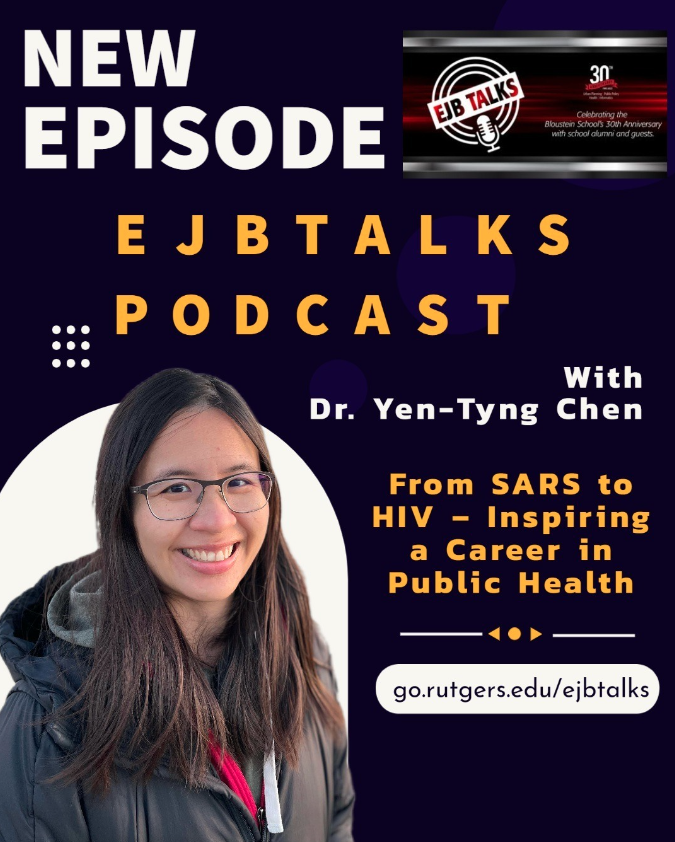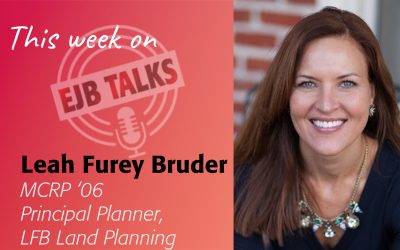On this episode of EJBTalks, Stuart Shapiro welcomes one of the Bloustein School’s new public health professors, Yen-Tyng Chen. They discuss the 2003 SARS outbreak personally impacted Professor Chen’s interest in public health. Professor Chen then shares how her experiences during her Ph.D. studies at Emory inspired her personal and intellectual interests in how race and built environments have huge impacts on health disparities. She also discusses her research focusing on racial health disparities from HIV infection rates to maternal mortality rates. They conclude by talking about her upcoming research centered around the public health impacts of structural racism.
Stuart Shapiro
Welcome to EJB Talks. I’m Stuart Shapiro, the Interim Dean of the Bloustein School, and the purpose of this podcast is to highlight the work being done by my colleagues and our alumni in the fields of policy, planning, and health.
We are spending this, our eighth season, speaking with the new faculty at the Bloustein School. We’ve hired 10 in the past year, in a wide array of fields. And if you’ve been listening, you know the fascinating and diverse work they’re doing. Today, we’re talking to one of our new professors in the public health arena, Professor Yen-Tyng Chen. Welcome to the podcast Yen-Tyng.
Yen-Tyng Chen
Thank you for having me, Dean Shapiro.
Stuart Shapiro
So we always start with an origin-type question. Why did you choose Public Health? And why sort of the area that you’re researching and health disparities generally?
Yen-Tyng Chen
Yeah, of course. I think that will be your long story. So like, just let me know when I should have stopped ((laughing)).
Stuart Shapiro
((Laughing))
Yen-Tyng Chen
Yeah, I think they are like multiple moments. I think there’s not a single aha moment, I know, this is my career for my life. But there are one or two moments that I will never forget, for my entire life.
The first one. I think it’s a very special year for this year is the 20 anniversary of the SARS outbreak back in Taiwan. So, back in 2003, like like when the SARS outbreak began, I actually lost my aunt. Through the outbreak, she was the head nurse at the Epi Center hospital. She got the virus during work and then and then she passed away, within two weeks. Yeah, that was devastating for the whole family. And that time I was just a rising senior in high school. And also my mom was a nurse. She volunteered to be deployed to that exact same hospital.
Stuart Shapiro
Oh wow.
Yen-Tyng Chen
We didn’t know. She didn’t consult with us, she just made her decision. And then volunteers, oh, I’m going into the hospital to help take care of the patients. Yeah, so those memories I will never forget. Like how I felt at that time.
Stuart Shapiro
Sure.
Yen-Tyng Chen
I had never had a chance to say goodbye to my aunt. And then I even don’t have the chance to talk to my mom like, Hey, Mom, how are you doing? It’s just chaos for a time. I remember my dad begged the government saying, hey, can you please provide the basic protective equipment to the frontline health workers? Like my mom was just wearing a raincoat. Like taking care of those patients. And then we don’t know what will be happening next. So I think that moment, like, I think it definitely really impacted me, when I decided what I would choose.
Stuart Shapiro
How about the disparities piece? What got you interested in that?
Yen-Tyng Chen
Yeah of course. So I think that focus maybe really started from my doctoral study at Emory. So when I was a doctoral student working on my mentor’s project, that project is examining how neighborhood characteristics influence substance use and HIV outcome among African American residents living in the inner city of Atlanta, Georgia. So as an international student, I had no idea, how come the neighborhood can have a such profound influence on an individual’s health. So I decided that I asked a friend to accompany me and then we drove to the study area. And I will again Never forget what I saw, like the people building the streets, like everything they in I saw the sign on the wall, like tell me everything. It’s just a feeling that wow, like, how fundamentally everything you are living with can really have an impact on your everyday life.
Stuart Shapiro
So let me follow up on that because you mentioned neighborhoods, and I know your work, you take this place-based approach. Can you sort of explain what that means in the public health context to our listeners?
Yen-Tyng Chen
Yeah, of course. So I think the place is just a very big count of where you spend time? It can be the place where you live, like your home. Or where do you work? Or where do you go to socialize? So it’s about like the social physical, the built environment. Like thinking about even the healthcare environment, infrastructure services, recreation, and grocery store. Like in the environment, like, what kind of stuff that you can access in that environment. Right. And typically, in literature, we see a lot of literature talking about, for example, zip code can have a better impact than your DNA in impacting your health.
So I think that is one way we can define the place based on the administrative boundaries of place or county. But recently, there’s a growing emphasis on the actual activity space. Like it’s about, we know that place is not a static idea, but also it is like actually like your commute, or you spent time in different areas, all of that collectively multiply, like the impact on your health.
Stuart Shapiro
So yeah, that’s I mean, all of this research, and I’m more familiar with the economic research than the health research, but this you know, where you grew up, and who your neighbors were, you know, having an effect on your education level, your eventual job prospects. Clearly, that’s true in the health arena as well.
Now we are, you know, one of our most famous programs is our urban planning program. Have you, you know, thought about how your work connects to the things that urban planners are thinking about?
Yen-Tyng Chen
Yeah, I’m glad you asked that because I think this is something in the public health field that we rarely talk about. And I think I, I am so fortunate to be part of the Bloustein community that I get the chance to see, like the planning people, and then their work. And then, last semester, I taught urban health. And then when I prepare the course, material when we talk about built environments, I really think there’s a missing piece there in the public health field that … Our conversation has been restricted to, yeah, we are collecting data, we provide evidence, and then we think about the community like participatory research, but we miss planner here, right?
So thinking about how… like the walkability issue. The street connectivity in terms of how you can get as easy access to public transportation, or do you have like why children don’t walk to school? Because the infrastructure doesn’t support that, there’s no sidewalk there. And then all we’re thinking about is access to health care. And so all of that is related to planning and how you design a city to be a healthy and sustainable place to live. So I really think like, this is something that has been missing in public health. And I think this is something that the faculty here at Bloustein can work on together.
Stuart Shapiro
Well, it’s great to hear you say that, because my former colleague, my former boss, Mike Greenberg, always talked about the deep connections between urban planning and public health. And indeed, if you look at the origins of public health, it’s things like trash pickup and clean drinking water, right, which are very much urban planning issues.
Yen-Tyng Chen
Right.
Stuart Shapiro
And so the origins of both fields come from a common origin, right? And so sort of thinking about that in the modern context is great.
I do want to get to some of your specific research, though, because you’ve added sort of a racial component to this as well. And I want, if you could talk about some of your work about these racial differences that manifest themselves in health differences, but come really from in part place-based differences.
Yen-Tyng Chen
Yeah, sure. I think there are a lot of different perspectives in thinking about health disparity across different racial ethnicity groups. So I focus a lot on HIV-related outcomes, especially among young black men who have sex with men and black transgender women. I think that’s… I just finished a class talking about this. So when you think about HIV infection, you’ll see that there are disproportionately new cases happening among the Black and African American population. But when you’ve really seen the number in terms of the intersectionality, between race, gender, and sexual orientation, you see that, for example, one in 11, white gay men will be diagnosed with HIV in their lifetime. And that number becomes one to eight among Latino, gay men. And then when you are looking at the number of young black gay men, the number becomes one in two.
So it’s one in two young black men who have sex with men will be diagnosed with HIV during their lifetime. It’s astonishing how big the gap is. And also, when you are thinking about all the racial segregation and housing segregation issues in the United States, we know that it’s not randomly distributed, where you live. In the class, we talk about, for example, life expectancy. It’s surprising that when you intake that example, in New Jersey, you will see that within 20 minute drive, that you can, the life expectancy in a neighborhood can come down from 89 years old, to 68 years old. So it’s more than a 20 years difference within a 20 minutes drive.
And then when you see about who lives there, those living in a place that only has 68 years of life expectancy, those are the most marginalized, vulnerable population, predominantly black individuals, low income. The average high school graduation rate will be as low as maybe 45% high school graduation rate.
Stuart Shapiro
Right.
Yen-Tyng Chen
So it’s hard for us to realize how race has fundamental, unfortunately, social determinants of health as a social concept.
Stuart Shapiro
Right? So you’ve been teaching here for a year now? How has this how is this resonated with your students?
Yen-Tyng Chen
Yeah, I’ve taught urban health. I’m teaching health disparity and epidemiology this semester. So I think one thing that students appreciate is topics like racial segregation, or housing segregation these are the topics that they are familiar with. They know they know this, like them from the heart. They know that. But when you present actual evidence and numbers, you pull the data in front of them, then they realize that oh my god, this is a problem that we are living with every day. Without seeing that actually, until we know how to say that, and then once you say that, you will never forget that. Just like the numbers that I mentioned, like about life expectancy, or thinking about the maternal mortality rate among black college graduate mothers. So for example, if you are a black woman, and you have college or graduate-level educational attainment, your maternal mortality due to pregnancy-related outcomes will be almost double that of white women who have less than a high school diploma degree.
Stuart Shapiro
Gotcha, gotcha.
Yen-Tyng Chen
Yeah.
Stuart Shapiro
Yeah, I would imagine that this really I mean, is sort of a hot topic for our students. And it’s really great that you’re connecting with them on this. What next? What are your big research plans for the next year or two?
Yen-Tyng Chen
Yeah, good question. So there is plenty of that. I have been focusing on a lot, as you mentioned, how plays how neighborhoods impact an individual’s health and also thinking about how social networks impact collectively your health. So for example, where you go, impacts who you know, and who you know, impacts where you go. All of those environments really impact your health and your health behaviors.
So I really want to bring this idea into the structural racism research, where I feel that we started to generate a lot of evidence. ((((The racism between black versus white. However, like, based on the 2020 census, we know American society has become more diverse than ever, that you see, like we have a growing population in like Hispanic Latino population, we have growing Asian population, we have a fast-growing multiracial population. So I think there’s this is the time when we really recognize that as a society the racism issue is really impacting anyone, any people of color. And this is something that I want to pursue in the future. I really found theories lately told literature, are focusing on a more diverse term of like people of color, and how the environment how the resource distribution, impacts this diverse population as a whole, and how we can generate the evidence of that. So I think this is something that has been lacking in the literature and is something that I want to pursue in the future.
Stuart Shapiro
Well, we will have to have you back on the podcast when you do that work, because I think it’ll be fascinating. Thanks so much for coming on today.
Yen-Tyng Chen
Sure. Thank you. Thank you for having me.
Stuart Shapiro
And a big thank you as well to our production team, as always, Amy Cobb and Karyn Olsen. We will see you next week with another talk from another expert at the Bloustein School until then, stay safe.




